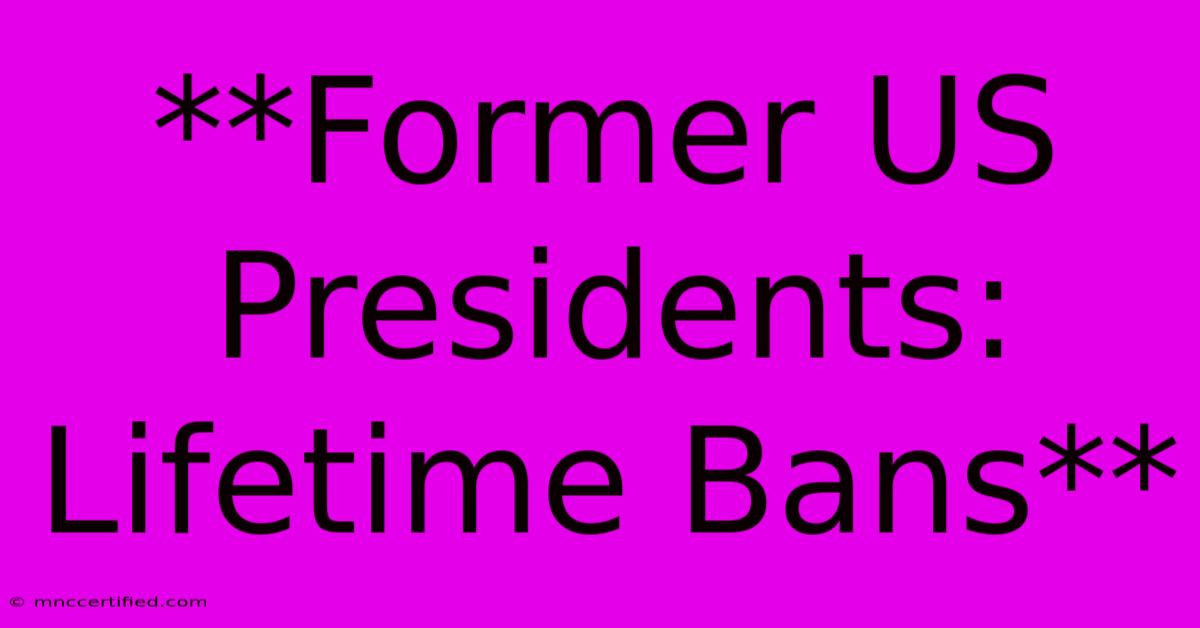**Former US Presidents: Lifetime Bans**

Table of Contents
Former US Presidents: Lifetime Bans and the Controversies They Stir
The presidency of the United States is arguably the most powerful and influential political position in the world. But what happens when a president leaves office? While they retain the title of "former president," the extent of their influence and power can dramatically shift. This begs the question: should former US presidents face lifetime bans on certain activities?
The Debate Over Lifetime Bans
The notion of placing lifetime bans on former presidents has sparked heated debates and raises complex ethical and legal considerations. Some argue that such bans are necessary to prevent conflicts of interest, protect national security, and maintain the integrity of the presidency. Others contend that these bans are excessive, violate the rights of former presidents, and could hinder their ability to contribute to society after leaving office.
Arguments for Lifetime Bans
1. Preventing Conflicts of Interest: Former presidents often maintain close ties with their former staff, advisors, and political allies. This can create a potential for conflict of interest if they engage in activities that could benefit their personal interests at the expense of the public good. For example, lobbying or accepting lucrative positions in industries they previously regulated.
2. Protecting National Security: Access to classified information is a crucial aspect of the presidency. Some argue that placing lifetime bans on former presidents from disclosing sensitive information or engaging in activities that could compromise national security is essential. This is particularly relevant in an era of increasing global threats and cyber security concerns.
3. Maintaining the Integrity of the Presidency: The presidency is a symbol of public trust and national leadership. Some believe that restricting former presidents from engaging in activities that could undermine the public's confidence in the office is crucial for maintaining the integrity of the presidency.
Arguments Against Lifetime Bans
1. Violation of Rights: Critics argue that lifetime bans on former presidents infringe upon their constitutional rights to free speech, freedom of association, and the right to pursue a livelihood. They argue that these bans are overly restrictive and could stifle valuable contributions from former presidents.
2. Lack of Evidence: There is limited evidence to suggest that former presidents consistently pose a significant threat to national security or engage in widespread unethical practices. Many argue that existing laws and ethical guidelines are sufficient to address potential conflicts of interest.
3. Hindering Contributions: Former presidents often possess unique expertise and experience that could be valuable to society. Lifetime bans could hinder their ability to contribute to research, diplomacy, or other areas where their knowledge could be beneficial.
Existing Laws and Policies
While there are no explicit federal laws prohibiting former presidents from engaging in certain activities, some existing laws and policies address potential concerns. For instance, the Emoluments Clause of the Constitution prohibits federal officials from accepting gifts or payments from foreign governments. Additionally, the Ethics in Government Act establishes rules governing post-government employment and prohibits government officials from using their positions for personal gain.
Case Studies: Controversies and Exceptions
Several examples illustrate the complexities surrounding lifetime bans and the controversies they generate. Former President Bill Clinton faced criticism for his post-presidency activities, particularly his lucrative speaking engagements and business ventures. Former President Donald Trump continued to engage in political activities even after leaving office, raising concerns about potential conflicts of interest and his influence on the Republican Party.
However, some former presidents have embraced roles that contribute to society while adhering to ethical guidelines. For example, former President Jimmy Carter has dedicated his post-presidency to peacebuilding and humanitarian work, receiving widespread praise for his efforts.
Conclusion: Navigating a Complex Landscape
The question of lifetime bans on former US presidents is a complex and multifaceted one, with strong arguments on both sides. Ultimately, balancing the need to protect national security and the integrity of the presidency with the rights and potential contributions of former presidents requires careful consideration.
As the nature of politics and the role of the presidency evolve, the debate over lifetime bans will likely continue. Whether these bans are implemented or not, it is crucial for former presidents to exercise caution and adhere to ethical standards to maintain public trust and contribute positively to society.

Thank you for visiting our website wich cover about **Former US Presidents: Lifetime Bans**. We hope the information provided has been useful to you. Feel free to contact us if you have any questions or need further assistance. See you next time and dont miss to bookmark.
Featured Posts
-
When Will Brics Currency Be Released 2024
Nov 07, 2024
-
How Much Would 1000 In Ethereum Be Worth Now
Nov 07, 2024
-
Get Live Score Psg Vs Atletico November 6 2024
Nov 07, 2024
-
West Indies Vs England 3rd Odi Live
Nov 07, 2024
-
J K Simmons Farmers Insurance Commercials
Nov 07, 2024